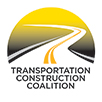(WASHINGTON)— The transportation construction, labor, and business community are jointly launching a digital and social media ad campaign designed to push lawmakers for a vote this summer on a transportation infrastructure investment package that improves mobility and fuels economic growth.
With transportation infrastructure funding at a critical point of debate in Washington in July, the TCC/ATM campaign launches July 12 with ads that will run in D.C. but will also reach lawmakers in nine key states: Arkansas, Arizona, Mississippi, Missouri, Montana, North Dakota, Ohio, South Dakota, and West Virginia. The ads will run through July 30 on social media and influential digital sites popular with D.C. legislators and influencers.
The D.C. campaign will consist of a combination of targeted programmatic digital and Twitter ads. The state/local ads will run only on Twitter.
The central message of the summer campaign: investing in transportation infrastructure is crucial to continuing the U.S. economic recovery and creating jobs. The ads direct viewers to a landing page on the Transportation Construction Coalition website, FundInfrastructureNow.org, which spells out the economic benefits of transportation infrastructure investment.
The digital ad samples are also available at FundInfrastructureNow.org.
The campaign is an initiative of the Transportation Construction Coalition (TCC) and U.S. Chamber of Commerce-led Americans for Transportation Mobility (ATM) coalition.
About the Transportation Construction Coalition
Established in 1996 and co-chaired by the American Road & Transportation Builders Association (ARTBA) and the Associated General Contractors of America (AGC), the 31 associations and labor unions that make up the TCC have a direct market interest in the federal transportation program. A complete list of members can be found at: www.transportationconstructioncoalition.org.
About the Americans for Transportation Mobility (ATM)
The Americans for Transportation Mobility (ATM) coalition was established by the U.S. Chamber of Commerce in 2000. It brings together businesses, the labor and union sectors, transportation stakeholders, and the public to advocate a robust transportation infrastructure grid in the United States. This includes promoting ongoing and sustainable funding through policies and broad-based initiatives.
###
